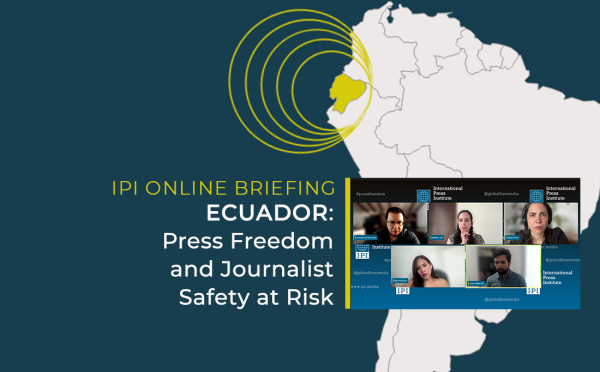The International Press Institute (IPI) today welcomed commitments made by the political leadership in Antigua and Barbuda to repeal criminal defamation – possibly as soon as May 3, World Press Freedom Day.
In a meeting Monday with IPI delegates, Prime Minister Winston Baldwin Spencer agreed that criminal defamation laws have no place in a democracy. “In this modern age, we have difficulty justifying the existence of such laws,” he admitted, and he committed to raising the matter with the country’s full cabinet.
He added, simply, “If a journalist is faced with prison for doing his or her job, that undermines freedom of the press.”
The prime minister expressed his desire to see the reform completed by May 3, when leading Caribbean journalists and civil-society representatives will gather in Willemstad, Curacao for a regional UNESCO-led observance of World Press Freedom Day.
“We are greatly encouraged by the commitment of the Prime Minister to repeal criminal defamation,” IPI Executive Director Alison Bethel McKenzie, who led the delegation, said. “While May 3 may be an ambitious timeframe for reforming the Libel and Slander Act to remove criminal penalties for defamation, we are assured that there will be a concerted effort to have it done by the time of next year’s general election.”
Antiguan Attorney General Justin L. Simon later echoed the prime minister’s views, emphasising that “civil remedies are the proper consequence [for defamation], not imprisonment.” He assured IPI: “You won’t have any difficulties in the repeal of criminal defamation here.”
Shawn Nicholas, senator with responsibility for information and state-owned media, and herself a former broadcast journalist, also told IPI she supported the repeal of criminal defamation.
Separately, the leader of the opposition Antigua Labour Party (ALP), Gaston Browne, called criminal defamation laws “inimical to a free press” and he pledged: “If the present government does not repeal this legislation by the 2014 general elections, the ALP will do so within 90 days of taking power.”
“We were impressed that both the government and the opposition appeared to approach this issue very seriously, and we are thrilled with the commitment of leading ministers to accelerate the removal of these outdated and wholly unnecessary laws,” Bethel McKenzie said, adding: “Doing so would position Antigua and Barbuda as among the progressive countries in the Caribbean with respect to press freedom.”
Colin James, president of the Antigua and Barbuda Media Congress, who accompanied the IPI mission, said: “The Antigua and Barbuda Media Congress (ABMC) welcomes the statements of Prime Minster Baldwin Spencer and leader of the opposition Gaston Browne and the commitment given by the Attorney General Justin Simon that they will support the repeal of criminal libel from the laws of Antigua and Barbuda.
“This is a positive first step and the ABMC will closely watching to ensure that the politicians’ words are followed up by timely action.”
Antigua and Barbuda is the first stop on IPI’s regional mission to campaign for an end to criminal defamation and advocate for journalist safety. Bethel McKenzie was joined in Antigua by James, who is also the national representative of the Association of Caribbean MediaWorkers – IPI’s strategic partner in the region – and Scott Griffen, IPI press freedom adviser for Latin America and the Caribbean.
During its three-day visit to the island nation, the IPI delegation met with a diverse array of government officials, publishers, editors and journalists to gather information about the local state of press freedom and media development. In all of these meetings, IPI representatives also stressed the importance of ethical reporting as an important counterpart to the repeal of criminal libel.
“Reforming the law is hugely important, but it is not the whole equation,” Bethel McKenzie pointed out. “Freedom of the press brings with it a responsibility to operate according to the highest standards of journalism.”
While Antigua boasts a largely-free press, IPI expressed concern about several issues, including the lack of full implementation of the country’s Freedom of Information Act and a high degree of media politicisation that some journalists say directly affects content.
IPI was also troubled by complaints from the online news site Caribarena alleging that government officials discriminated against it when distributing information and granting interviews due to its investigative reporting.
Following the completion of its mission, IPI will release a detailed report on the state of Antigua and Barbuda’s press, together with the results of its visits to Guyana, Suriname, the Dominican Republic, Trinidad and Tobago, and Curacao.
Last year, IPI visited Barbados, the Dominican Republic, Jamaica, and Trinidad and Tobago to advocate for defamation reform. The Dominican Republic and Jamaica are currently considering defamation reform bills, while Grenada, following IPI lobbying, became the first Caribbean country to decriminalise libel, in July 2012.
IPI also presented the Antiguan government with the Declaration of Port of Spain, an IPI-sponsored document calling for the repeal of the region’s criminal defamation and insult laws, which has been signed by numerous Caribbean media associations as well as several global press freedom groups.


